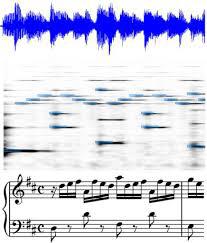Search Results for author: Wei-Hsiang Liao
Found 14 papers, 4 papers with code
MR-MT3: Memory Retaining Multi-Track Music Transcription to Mitigate Instrument Leakage
no code implementations • 15 Mar 2024 • Hao Hao Tan, Kin Wai Cheuk, Taemin Cho, Wei-Hsiang Liao, Yuki Mitsufuji
This paper presents enhancements to the MT3 model, a state-of-the-art (SOTA) token-based multi-instrument automatic music transcription (AMT) model.
MusicMagus: Zero-Shot Text-to-Music Editing via Diffusion Models
no code implementations • 9 Feb 2024 • Yixiao Zhang, Yukara Ikemiya, Gus Xia, Naoki Murata, Marco Martínez, Wei-Hsiang Liao, Yuki Mitsufuji, Simon Dixon
This paper introduces a novel approach to the editing of music generated by such models, enabling the modification of specific attributes, such as genre, mood and instrument, while maintaining other aspects unchanged.
HQ-VAE: Hierarchical Discrete Representation Learning with Variational Bayes
no code implementations • 31 Dec 2023 • Yuhta Takida, Yukara Ikemiya, Takashi Shibuya, Kazuki Shimada, Woosung Choi, Chieh-Hsin Lai, Naoki Murata, Toshimitsu Uesaka, Kengo Uchida, Wei-Hsiang Liao, Yuki Mitsufuji
Vector quantization (VQ) is a technique to deterministically learn features with discrete codebook representations.
Manifold Preserving Guided Diffusion
no code implementations • 28 Nov 2023 • Yutong He, Naoki Murata, Chieh-Hsin Lai, Yuhta Takida, Toshimitsu Uesaka, Dongjun Kim, Wei-Hsiang Liao, Yuki Mitsufuji, J. Zico Kolter, Ruslan Salakhutdinov, Stefano Ermon
Despite the recent advancements, conditional image generation still faces challenges of cost, generalizability, and the need for task-specific training.
On the Language Encoder of Contrastive Cross-modal Models
no code implementations • 20 Oct 2023 • Mengjie Zhao, Junya Ono, Zhi Zhong, Chieh-Hsin Lai, Yuhta Takida, Naoki Murata, Wei-Hsiang Liao, Takashi Shibuya, Hiromi Wakaki, Yuki Mitsufuji
Contrastive cross-modal models such as CLIP and CLAP aid various vision-language (VL) and audio-language (AL) tasks.
Consistency Trajectory Models: Learning Probability Flow ODE Trajectory of Diffusion
1 code implementation • 1 Oct 2023 • Dongjun Kim, Chieh-Hsin Lai, Wei-Hsiang Liao, Naoki Murata, Yuhta Takida, Toshimitsu Uesaka, Yutong He, Yuki Mitsufuji, Stefano Ermon
Consistency Models (CM) (Song et al., 2023) accelerate score-based diffusion model sampling at the cost of sample quality but lack a natural way to trade-off quality for speed.
 Ranked #2 on
Image Generation
on CIFAR-10
Ranked #2 on
Image Generation
on CIFAR-10
Timbre-Trap: A Low-Resource Framework for Instrument-Agnostic Music Transcription
no code implementations • 27 Sep 2023 • Frank Cwitkowitz, Kin Wai Cheuk, Woosung Choi, Marco A. Martínez-Ramírez, Keisuke Toyama, Wei-Hsiang Liao, Yuki Mitsufuji
Several works have explored multi-instrument transcription as a means to bolster the performance of models on low-resource tasks, but these methods face the same data availability issues.
VRDMG: Vocal Restoration via Diffusion Posterior Sampling with Multiple Guidance
no code implementations • 13 Sep 2023 • Carlos Hernandez-Olivan, Koichi Saito, Naoki Murata, Chieh-Hsin Lai, Marco A. Martínez-Ramirez, Wei-Hsiang Liao, Yuki Mitsufuji
Restoring degraded music signals is essential to enhance audio quality for downstream music manipulation.
Automatic Piano Transcription with Hierarchical Frequency-Time Transformer
1 code implementation • 10 Jul 2023 • Keisuke Toyama, Taketo Akama, Yukara Ikemiya, Yuhta Takida, Wei-Hsiang Liao, Yuki Mitsufuji
This is especially helpful when determining the precise onset and offset for each note in the polyphonic piano content.
Music Mixing Style Transfer: A Contrastive Learning Approach to Disentangle Audio Effects
1 code implementation • 4 Nov 2022 • Junghyun Koo, Marco A. Martínez-Ramírez, Wei-Hsiang Liao, Stefan Uhlich, Kyogu Lee, Yuki Mitsufuji
We propose an end-to-end music mixing style transfer system that converts the mixing style of an input multitrack to that of a reference song.
Automatic music mixing with deep learning and out-of-domain data
1 code implementation • 24 Aug 2022 • Marco A. Martínez-Ramírez, Wei-Hsiang Liao, Giorgio Fabbro, Stefan Uhlich, Chihiro Nagashima, Yuki Mitsufuji
Music mixing traditionally involves recording instruments in the form of clean, individual tracks and blending them into a final mixture using audio effects and expert knowledge (e. g., a mixing engineer).
Automatic DJ Transitions with Differentiable Audio Effects and Generative Adversarial Networks
no code implementations • 13 Oct 2021 • Bo-Yu Chen, Wei-Han Hsu, Wei-Hsiang Liao, Marco A. Martínez Ramírez, Yuki Mitsufuji, Yi-Hsuan Yang
A central task of a Disc Jockey (DJ) is to create a mixset of mu-sic with seamless transitions between adjacent tracks.
Preventing Oversmoothing in VAE via Generalized Variance Parameterization
no code implementations • 17 Feb 2021 • Yuhta Takida, Wei-Hsiang Liao, Chieh-Hsin Lai, Toshimitsu Uesaka, Shusuke Takahashi, Yuki Mitsufuji
Variational autoencoders (VAEs) often suffer from posterior collapse, which is a phenomenon in which the learned latent space becomes uninformative.
AR-ELBO: Preventing Posterior Collapse Induced by Oversmoothing in Gaussian VAE
no code implementations • 1 Jan 2021 • Yuhta Takida, Wei-Hsiang Liao, Toshimitsu Uesaka, Shusuke Takahashi, Yuki Mitsufuji
Variational autoencoders (VAEs) often suffer from posterior collapse, which is a phenomenon that the learned latent space becomes uninformative.






